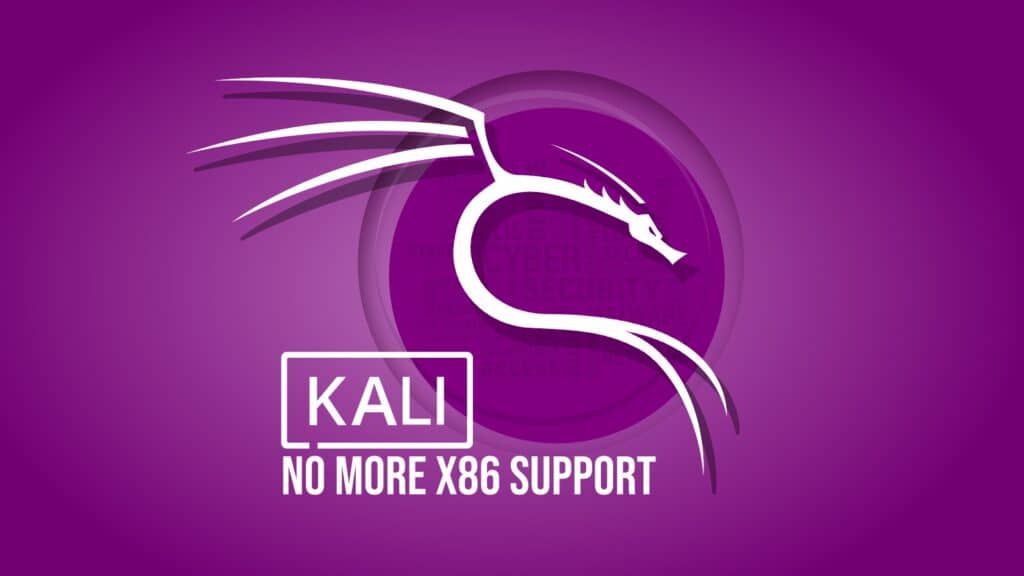The era of the i386 architecture is coming to an end in Kali Linux. Starting this week, support for i386 is being significantly reduced: the i386 kernel and images are being discontinued. This means no more new releases or images for the 32-bit architecture.
Before you get worried, let us reassure you—everything is perfectly fine and this change was completely expected. In fact, Kali was one of the last holdouts that supported the old x86 architecture. To make things clearer, let’s shed some light on the terminology:
- amd64: Refers to the x86-64 architecture, the 64-bit version of the x86 instruction set (with the first amd64 CPU released in 2003), which is currently the most widely used of almost all OSes.
- i386: Refers to the original 32-bit x86 architecture, introduced in 1985. The term “i386” is often used to describe 32-bit versions of the x86 architecture. The last i386 CPUs, like certain Intel Pentium 4 models, were discontinued around 2007.
With the clarification thus made, go back to the main topic. First, starting with Linux kernel version 6.11, the kernel will no longer be built for the i386 architecture. This change has already taken effect in Kali’s rolling version.
Second, the discontinuation of i386 support means that Kali will no longer provide i386 installer images, Live images, or Pre-Built VM ones. This will impact the upcoming weekly image release (2024-W44, scheduled for October 28) and the next official release, Kali Linux 2024.4, expected before the end of the year.
With this in mind for record-keeping and history, the Kali 2024.3 released last month will remain the last to officially offer images for the 32-bit architecture.
However, i386 packages aren’t being removed from the Kali repository. Users can still run i386 software on a 64-bit Kali system using the command “dpkg –add-architecture i386” and then install i386 packages through the package manager.
In other words, running i386 binaries on a 64-bit system remains fully supported. Additionally, i386 Docker images are available for those who need them.
If you’re curious, here’s how things are going with i386 support for the leading Linux distributions:
- Ubuntu: Starting with Ubuntu 18.04 LTS, Canonical began phasing out support for the i386 architecture. By Ubuntu 20.04 LTS, the official i386 desktop images were discontinued.
- Fedora: Fedora stopped producing 32-bit installation images with the Fedora 31 release in 2019.
- Arch Linux: The distro discontinued i386 support in November 2017. The final i386 release was in February 2017. Since then, Arch Linux has been 64-bit only.
- Debian: Debian still officially supports i386, but many packages and performance optimizations target 64-bit systems.
- openSUSE: As of openSUSE Leap 15.0, the project no longer provides 32-bit installation media. However, some 32-bit packages are still available for legacy applications. OpenSUSE Tumbleweed also dropped i386 support.
- CentOS: Before it transitioned to CentOS Stream, CentOS stopped supporting i386 around version 7. CentOS 8 did not offer 32-bit versions.
So, as you can see, most mainstream Linux distributions have abandoned or are phasing out support for 32-bit x86 (i386) architectures due to the shift towards 64-bit systems and declining usage of 32-bit hardware.
In light of this, Kali’s move is completely expected. While hardware moves on, software support tends to linger. Over time, fewer i386 CPUs remain, and support for the architecture in Linux distributions has steadily faded.
Believe it or not, a key factor in keeping the i386 alive these days is the world of gaming. Many older titles were designed for 32-bit systems and are still popular today. As long as the gaming community supports these games, a baseline of i386 packages will likely persist.
For more information on Kali’s discontinuation of i386 support, refer to the official announcement.

they should have done this a long time ago